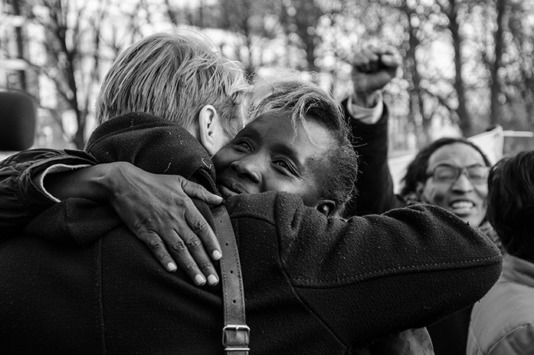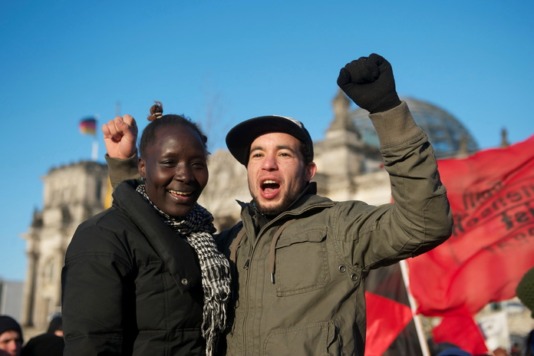- About
- Topics
- Picks
- Audio
- Story
- In-Depth
- Opinion
- News
- Donate
- Signup for our newsletterOur Editors' Best Picks.Send
Read, Debate: Engage.
| June 18, 2015 | |
|---|---|
| topic: | Refugees and Asylum |
| tags: | #asylum seekers, #Berlin, #Germany, #Give Something Back to Berlin, #MakeSense, #refugees, #Refugees Welcome |
| located: | Germany |
| by: | Vanessa Ellingham |
More than 200,000 people sought asylum in Germany in 2014 – a record number that is likely to be challenged again this year.
Many asylum seekers have already travelled for weeks, sometimes months, when they arrive in Germany, but once here they still face long processing times in which they are generally not permitted to work or study. In the worst cases, they can wait in limbo for up to two years, unable to provide for themselves or upskill to prepare for the German labour market.
Asylum seekers are housed en masse in disused schools or community buildings, or even in repurposed shipping containers. Many of the housing arrangements are situated in small towns or villages where asylum seekers aren’t always welcome, fuelling tensions between locals, asylum seekers and the authorities.
The shortage of housing for asylum seekers has caused such a strain in some regions that in January one city proposed housing 21 refugees in a barracks on the grounds of a former Nazi concentration camp.
Living restricted lives in small villages with no end in sight breeds boredom and depression. To say treatment of asylum seekers in Germany is sub-par would be an understatement.
Thankfully some German residents have taken it upon themselves to provide better opportunities for the asylum seekers living – or waiting – nearby in their communities.
One initiative is Refugees Welcome, which aims to house asylum seekers in shared flats along with locals, rather than holding them segregated in mass accommodation.
Refugees Welcome connects renters looking for a flatmate with an asylum seeker in their town or city. Then the organisation helps the flatmates find funding to cover the asylum seeker’s rent, and continues to provide support once everyone is moved in.
Already almost 800 people have offered their homes up to asylum seekers since the project began late last year.
Berlin couple Mareike Geiling and Jonas Kakoschke launched the project and were the first to welcome an asylum seeker into their home through the project, which is currently processing about 400 applications across Germany and Austria.
The 28 and 31-year-old (respectively) now live with a 39-year-old man from Mali. The three flatmates take turns cooking and cleaning, just like in any other shared flat.
Geiling says she has seen no big difference between sharing her flat with a German and a refugee, except “we speak more often in English or French. But I would say this is typical for every international shared flat in Berlin.”
“Sometimes we look through some official forms [with him] and of course it makes a difference that he is dependent on what the authority for foreigners decides. But we are almost close friends now and hanging out with him is really fun.”
The man, who has his rent covered by donations, had been mostly living on the street before he moved in.
Refugees Welcome relies on micro-donations, and in one of three cases funding from the Job Centre or the Social Welfare Office in cases where it is possible to switch a person out of mass accommodation into residential accommodation. Other flat shares have been able to privately fund their new flatmate’s rent.
All types of residential accommodation are welcome to sign up for the project, including families, couples and singles. A Syrian man currently living with a single mother in Frankfurt wrote to Refugees Welcome to say their living together is going so well he feels like a family member.
The initiative is all about asylum seekers living together with locals, like locals, with the aim of broadening their prospects and providing a positive first experience of life in Germany. This means that they will only be placed in already-occupied accommodation (not vacant apartments), and they must be given their own room – so no couchsurfing.
Geiling says the project’s goal is to “open up our homes, and in doing so, offer refugees a warm welcome”.
“In a shared flat you really get in contact with the German people and the society, learn the language faster and settle down easier.”
Berliner spirit
It is perhaps no surprise that a project like this would be launched in Berlin. Last year, protests by a group of asylum seekers occupying the Gerhart-Hauptmann-Schule resulted in such strong support from locals in Kreuzberg, the heart of countercultural Berlin, that 1700 riot police were sent from around Germany to patrol the block surrounding the school.
Berlin is also increasingly known for its incubation of social innovation. The plight of asylum seekers living locally, as well as news of mass migrant deaths in the Mediterranean, has had a palpable impact in this city. In the past year, Berlin has given birth to both CUCULA, a social innovation project that involves refugees in the process of crafting designer furniture, and Über den Tellerand Kochen, which published a cookbook of recipes collected at refugee camps and is using the profits to feed back into integration projects.
Give Something Back to Berlin, which aims to involve the city’s newcomers in volunteer community projects, has particularly focused on work that serves the city’s asylum seekers – it is probably best known for its regular cooking gathering where expats, refugees, asylum seekers and locals all share dishes from their home countries.
Innovative solutions to global problems
Berlin-based social innovation incubator MakeSense ran a series of events throughout April focusing on innovative projects supporting asylum seekers and refugees.
As EU leaders held emergency meetings to discuss the latest migrant tragedies in the Mediterranean, creators, innovators and entrepreneurs met with interested members of the public in Berlin to discuss how they might contribute to the cause.
From creative brainstorming sessions to theatre performances, the MakeSense Refugee Month aimed to tackle the issue of social inclusion by highlighting the best ideas and most inspiring solutions the city has to offer.
Refugees Welcome was of course on the agenda, with an innovation workshop designed to solve the entrepreneurs’ ongoing challenges by crowdsourcing solutions from the public.
Daniel Hires, who kickstarted the MakeSense hotspot in Berlin, says the challenge they focused on this time was finding innovative ways to match refugees and housing.
“There were numerous ideas including platforms with videos and profiles, or handbooks for the buddies. Now it's up to the entrepreneur to use these concepts as a basis for how they solve their issues.”
Geiling at Refugees Welcome says funding remains their key challenge - if they knew they had guaranteed funding for a certain length of time, this would further enable them to work towards a goal.
“We need money to have a real perspective.”
Now the question remains: what will it take for EU leaders to listen up, and make these great ideas go global?
Read more on FairPlanet's dossier ESCAPE
By copying the embed code below, you agree to adhere to our republishing guidelines.


